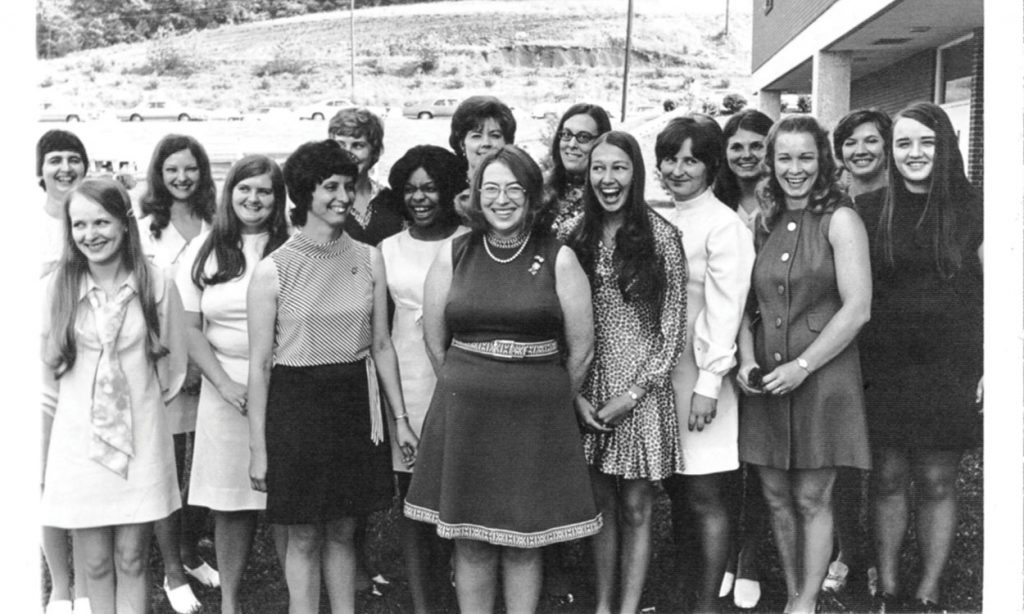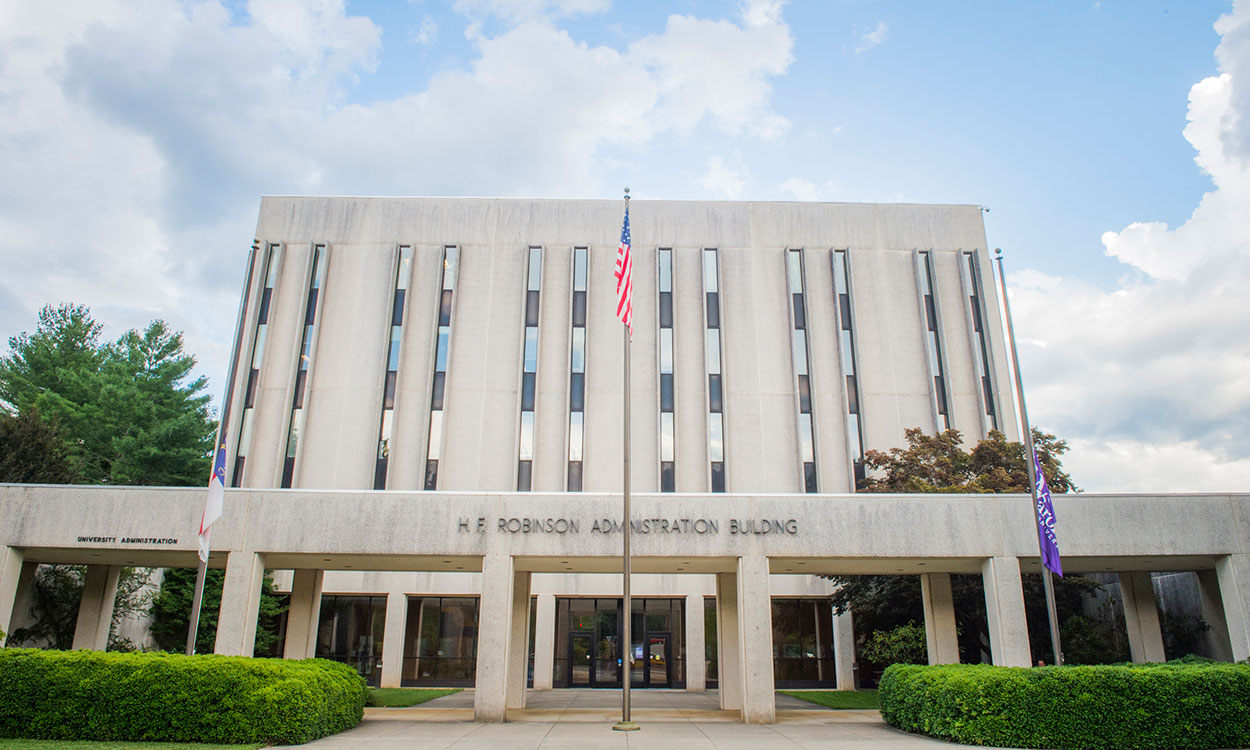CATAMOUNT CARE
In 1969, on the eve of a new decade and with a newfound sense of promise on campus, Western Carolina University began what would become its School of Nursing.
Nursing, as a profession, is an in-demand and challenging career. To be a nurse requires specialized skillsets and aptitudes, and a high level of learning – plus a license to practice. A half-century after beginning its nursing program, WCU has more than 2,000 alumni who practice in clinical and leadership roles nationwide and now offers undergraduate and graduate degrees as well as a doctor of nursing practice degree.
“This is a proud moment,” said Tony Roberson, School of Nursing director since August 2017, noting that WCU’s nursing curriculum is recognized nationally and internationally. This institutional milestone of preparing generations of nurses for a role that is vital to primary care, surgical care and intensive care – the key word being care – will be celebrated throughout 2019-20, with a series of events in the fall and spring semesters.
“We plan to have a gala event on campus in the fall, and there will be other opportunities for involvement all year long,” Roberson said. “As much as we will mark the occasion and reflect, we also want to hear from School of Nursing alumni, faculty and staff about our common bonds, career experiences and shared visions of what the future can hold.”
The program’s first graduating class in 1973 numbered 16. The cliché of “humble beginnings” could apply in hindsight, but then, as now, the quality of nursing instruction at WCU was top-notch, alumni say. The program has grown and expanded exponentially in the decades since, but the fundamentals are still in place, with a reputation built on results.
“I was very fortunate to have a great mom who wanted to ensure I chose a strong nursing program,” said Sherry Day Peel ’85, Duke Anesthetic Center administrator. “In the early ’80s – before the internet to research programs – my mom called the North Carolina Board of Nursing to inquire about bachelor of science in nursing programs and learned WCU was in the top five for board passing rates. Once I came to tour WCU, there was no other school I wanted to attend. Western was the only college that I applied to.”
Peel described being accepted to the program as a very competitive process and, once admitted, she found it to be exacting in its standards.
“I often tell people that nursing school was one of the hardest things I’ve ever done,” said Peel. “My first clinical was at Harris Regional Hospital in Sylva. Sharon Jacques was my clinical preceptor. She talked me through my first injection on the tiniest little lady. I was incredibly nervous, but got through it just fine. Throughout my junior year, clinicals focused on local hospitals and health care in the community, including Cherokee. The co-op services at WCU helped me obtain an internship at Duke over the summer in labor and delivery. I was able to experience ‘real-life’ nursing for the first time, from shift work, emergencies, death and birth.”
Her clinical experience was well-rounded, Peel said. “I think that’s why I have never hesitated to venture out and explore different areas of nursing. I have worked in hospitals, home health and community college associate degree in nursing programs, but I’ve hve been in ambulatory care at Duke since 2005 where I started as a nurse manager and now am an administrator in clinical operations,” she said. “I still use my nursing skills and feel they help with decision making whenever new services or processes are added to the clinics that I manage. Everything that I do has a nursing assessment component to it in terms of looking at things from all aspects and how all parts can affect outcomes or reach goals.”

The nursing program’s first graduating class in 1973 numbered 16.
Mary Welch Knecht ’86, who works at Asheville Eye Associates, called Jacques a steady influence in the program, someone who encouraged and helped individuals, just as she steered curriculum and advanced the profession. “She was so nice to let me back in the program after I had stayed out a year,” Knecht said. “She was so important to me and the program at the time.”
Jacques taught nursing at WCU for 36 years. She served as director for the Registered Nurse to Bachelor of Science in Nursing Degree Program and is the namesake for a scholarship available to outstanding students enrolled in the RN to BSN Program.
The nursing profession has seen numerous changes over the years, Jacques said, including the educational level expectations for nurses. “That’s where WCU’s registered nurse to bachelor of science degree in nursing came from,” she said. “So many nurses in the area had their associate degrees and needed to achieve that next level, so
Western looked at what to offer to expand their education without repeating anything. We had to find out what they wanted to know, what they needed to know and what
their plans were.”
Another foundational building block for WCU’s nursing program is that students receive hands-on learning opportunities, Jacques said. “It is important to give students a variety of experiences, with different relationships with physicians and patients in different settings. From a small rural hospital to an urban clinic and community service projects with diverse clientele, working in those situations and learning and having a broader experience to draw from in the future is very important,” she said.
The foundations of the nursing school go back to 1965, when Mary Kneedler, a WCU faculty member and registered nurse, was tasked with chairing a committee to conduct a feasibility study about the potential of adding a nursing program. When the program started, Kneedler was the logical choice to lead it. She was a nurse and knew from the study the immediate and long-term program needs. Perhaps most importantly, she knew what initial course offerings would attract students.
Katie Kalarovich ’73, WCU’s Mary Kneedler Distinguished Professor of Nursing and the School of Nursing clinical placement coordinator, was a member of that first graduating class. “From the time I was 5 years old and stood on a stool, feeding my sick grandfather ice cream, I knew I would be a nurse,” said Kalarovich, a first-generation college graduate.
“As a senior in high school, we were allowed a free day off from classes to visit colleges. I had already decided to go to Baptist Hospital Nursing in Winston-Salem, but went along for the ride with friends to Cullowhee in early 1969. Dr. Hugh Matthews, the physician in Student Health Services, was an old family friend. When visiting with him on campus, he sent me to visit with Mary Kneedler, ‘just to hear her out.’ She sold me on applying to WCU even though at that time I would not have any ‘nursing’ classes for the first two years,” she said.
Kalarovich’s career has held many highlights, including establishing Jackson County’s first high-risk perinatal clinic, working as risk and claims manager with St. Joseph’s Hospital in Asheville, establishing a private legal nurse consulting business and serving on a legal firm’s litigation team, where she pioneered the nurse-paralegal role.
Since 2015, she has served as WCU’s clinical site coordinator, acting as a liaison with the clinical facilities, preceptors and students. “I am forever grateful to Dr. Matthews for sending me to Mary Kneedler and for her encouragement to apply to the program,” Kalarovich said.
Mable Carlyle ’73, also part of that first graduating class and later a faculty member, agreed with Jacques’ assessment of Kneedler’s impact. “Mary was the right person at the right time,” Carlyle said. “There had been such a positive response from the community to starting a baccalaureate nursing program, and she was influential in how it came about. She was well respected and got things done.”
Carlyle remembers those earliest days of the program as exciting, challenging and rewarding, with colleagues socializing and learning the expectations of nursing, although she says she stood apart. “It was all young people, except for one. And that one was me,” she said. “I was an RN living in Black Mountain with four children, commuting to Cullowhee. It gave me a different perspective, but we all shared similar goals.”
Nurse education became her career. “I was very strict with students, by golly, in that they treat patients with respect, recognize them as human beings and understand them as a person. I always thought that was the most important influence I could have. The program had high standards and it was important to stick to them,” said Carlyle, who taught at WCU for 23 years, retiring in 2000.
From its beginning, rural health needs have been a local consideration for the nursing program, not only as an opportunity for clinical training, community service and outreach, but for future employment opportunities.
“Harris Regional Hospital and Swain Community Hospital are honored to celebrate the successes of WCU’s School of Nursing,” said Lucretia F. Stargell, vice president of business and service line development for the Duke LifePoint Hospitals. “This important anniversary demonstrates WCU’s commitment to training generations of nurses, caring for our communities and strengthening the local economy through dedication to a discipline rooted in human compassion.”
Linda Anderson ’84 MSN ’10 is the nursing academic program specialist with Mission Health, the region’s largest employer with six hospitals and numerous outpatient and surgery centers in Western North Carolina. “The School of Nursing is a valuable partner for Mission Health in our service to the community,” Anderson said. “There’s an integral role the university performs in many aspects. There’s an exchange of research, data and surveys, and feedback. WCU is a valuable resource.”
Another exemplary area of experiential learning and dedicated instruction is WCU’s Nurse Anesthesia Program, which offers a high-fidelity anesthesia simulation center where students receive training on the most advanced human patient simulator on the market. Established in 2007, the anesthesia program was implemented to respond to the severe shortage of nurse anesthetists and the growing need for culturally competent anesthesia care throughout the region. Today, the program strives to endow critical-care nurses from diverse backgrounds with the skills needed to deliver cost-effective care to medically underserved populations and other high-risk groups.
As the School of Nursing continues its growth and search for excellence, Roberson said, the 50th year mark is more than just a time to reflect, but a time to look forward as well. A new post-baccalaureate nurse residency program was announced in June 2018 to enhance community-based primary care clinical experiences for students, made possible by a $2.7 million grant from the U.S. Health Resources and Services Administration. Kae Livsey, associate professor in the School of Nursing, is serving as lead on the project.
The new residency program will expand services related to mental health, substance abuse treatment and primary care, which are often the most challenging for patients to access in Western North Carolina, Roberson said. Community partners for the project include Appalachian Mountain Community Health Centers, Blue Ridge Health, Cherokee Indian Hospital, Mountain Area Health Education Center and the Mission Health System-Mission Medical Associates. Those partners will be part of a regional consortium to support the grant, as well as serve as learning sites for program participants.
Sarah M. Henderson MSN ’16, an assistant professor of nursing at WCU, says the School of Nursing has an outstanding reputation, with graduates hired by health care facilities all over the state, across the nation and even internationally.
“Like myself, many of the faculty within the School of Nursing are WCU alumni,” Henderson said. “I take great pride in being able to give back to my alma mater and to be an educator in the same School of Nursing that I attended as a student. The professors who made such a positive impact in my life by sharing their expertise and knowledge with me as a student are now my colleagues. It’s truly a blessing to be part of this prestigious program. It’s something that I do not take for granted.”
Nurses are caretakers who live their lives in the service of others, she said. “We sacrifice time with our families, missing birthdays, holidays, nightly meals, bedtime stories, school plays and dance recitals in order to assure that our patients – your loved ones – receive the care that they deserve no matter the day of the week or hour of the day,” she said.
“Being a nurse is more than a career choice,” Henderson said. “Being a nurse is a calling.”
To view a timeline of the nursing program's 50 years, click HERE.
Lauren Stepp, WCU Nurse Anesthesia Program administrative support associate, contributed to this article.

